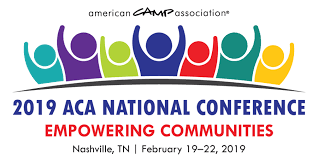|
American Camp Association (ACA) National Conference
Theme: Empowering Communities Nashville, Tennessee February 19-23, 2019 Title: Possibilities and Limitations of Summer Camps to Address Summer Learning Loss: A Mixed Method Study Presenters: Ta-yang (Diane) Hsieh, Jacqueline Sohoo Abstract Summer learning loss, which refers to the drop in academic scores between end of one school year and start of the next, is a factor of educational inequity. Every summer, under-resourced youth lose two more month’s learning than their peers with better access to resources (e.g., books, tutoring, museums) even though they were comparable in academic gain during the semesters (Cooper et al., 2000). Various interventions have been attempted to remediate summer learning loss including summer camp (Borman & Boulay, 2004). Unlike school-based remedial summer classes, which are often associated with sense of punishment, summer camps tend to be more informal and enjoyable, hence conducive to learning. The purpose of the current study was to evaluate the academic impact of Camp Phoenix (CP) 2018, a 3-week sleep-away camp that served 73 low-income middle schoolers from the greater Oakland, CA area. Half of the campers self-identified as Latino/a, 20% as multiracial, and 15% as African American. Campers received math and English "brainfeeding" (classes) each for eighty minutes daily, in addition to a forty-minute workshop that was tailored to individual progress. One "brainfeeder" (teacher) instructed 10-12 campers with aid from two counselors. Instruction was activity-based and located outdoors. Multiple sources of data were triangulated to evaluate the academic impact of CP. First, all campers completed reading (passage comprehension and sentence completion) and math (fraction, two-digit division, unit rate, etc.) assessments at the beginning and end of camp. Secondly, to capture growth that might not manifest in terms of test scores, the first author was immersed as a participant observer and taught all 73 campers as one of the math "brainfeeders". Additionally, the first author interviewed all other six "brainfeeders" at the beginning and end of camp, totaling to 180 minutes of interview data. Lastly, all campers completed a survey on the last day of camp. Responses related to academic learning were used to support findings. On average, campers improved 26% from their pre to post math assessment; the growth was statistically significant (t = 10.40, p < .001, effect size r = .77). Campers were more leveled on math score at the end of camp than when they came in. That is, campers who had lower pre-score showed greater growth in math. In regard to reading, campers on average improved 10.3% (t = 12.36, p < .001, effect size r = .82), which approximates to two months of learning after adjusting for individual camper’s age (Pearson Education, 2018). Growth in reading was evident in both passage comprehension (t = 5.12, p < .001, effect size r = .53), and sentence completion (t = 4.01, p < .001, effect size r = .44). Sixty-five percent of the campers showed growth in both reading and math; all but one of the remaining campers showed growth in either math and/or reading. Eight successful strategies and three challenges emerged from brainfeeders’ interviews and campers’ survey responses. Given that we serve low-income youths, our findings speak to outdoor-based summer camp as a potential space to remediate summer learning loss. Keys to our success include fun and relevant curriculum, high adult-camper ratio, leveraging nature as classroom, structured practices, and camper-centered instructions. Some challenges identified include mixed ability class, difficulty conveying sense of autonomy to campers, and communication among staff. On a broader level, CP’s positive academic impact and the fact that it is affordable to an underserved population could be examined as an act of social justice. Comments are closed.
|
Resources for:
|
|


